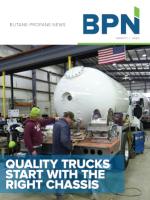Tuesday, March 3, 2020
(March 3, 2020) — By Frank B. Thompson… The above question is asked many times by propane marketers who visit with us at the trade shows that we attend, or when we receive a call from a marketer who has just found out that a loss wasn’t covered. So let’s look at several scenarios showing how marketers chose their insurance agent and insurance company.
 To begin with, there are over 1800 insurance companies doing business in the United States and over 1.2 million licensed insurance agents. The majority of the insurance companies and agents are personal lines agents (car insurance, home, and small Main Street business). What that means to the marketer who is required to insure his business is, he has choices. The choice is usually to deal with a local agent who stops by occasionally to fill his propane bottle and visits with the office staff when he pays for his propane.
To begin with, there are over 1800 insurance companies doing business in the United States and over 1.2 million licensed insurance agents. The majority of the insurance companies and agents are personal lines agents (car insurance, home, and small Main Street business). What that means to the marketer who is required to insure his business is, he has choices. The choice is usually to deal with a local agent who stops by occasionally to fill his propane bottle and visits with the office staff when he pays for his propane.
DO NOT SOLICIT
The local agent goes to the insurance company he represents and asks for them to quote. Propane is considered a “do not solicit” by most insurance companies and so the local agent is forced to go to a third-party surplus lines broker to find a market to write the account. That decision is where the disconnect begins.
The surplus lines broker represents insurance companies that are usually non-admitted in most states and write accounts that are hard to place, normally at a higher price and with less coverage.
The surplus lines broker sends the local agent a supplemental application that needs to be completed and signed by both the agent and the marketer. The agent usually doesn’t understand the questions, so a lot of guessing can occur or improper answers can be given. The result is an inaccurate or incomplete application that is rejected by the insurance company underwriter.
REJECTION
So begins a tedious, time-consuming game. The marketer needs the insurance and communicates that to the agent. The agent goes back to the surplus lines broker to find out why the submission was rejected. The surplus lines agent talks to the insurance company underwriter to find out why the account was declined. The surplus lines broker communicates the incorrect answers on the submission and the agent then has to go back to the marketer who has to explain what the question was asking.
The correct answers go back to the surplus lines broker who now has a job to get the underwriter to change his mind (good luck!) and provide a quote.
The agent presents the quote to the marketer, and because the marketer has the misconception that all insurance agents and insurance companies are equal and “the price is right” (low), he buys the policy. He is trusting the agent to know enough about the propane business so that his business is properly insured.
The agent may not know enough about the insurance company or the services they do or do not provide, to notice that the policy may have been issued differently from what he presented and the insured thought he bought. There may be exclusions that take away needed coverage.
Little errors on the policy can play a major role in a claim—for instance, the property policy was issued on an Actual Cash Value basis rather than Replacement Cost. The difference between the two can result in a huge settlement discrepancy, forcing both the insured and the agent to seek legal counsel.
COMMON MISTAKES
The most common mistake is buying insurance based on the lowest quote from an insurance company that is just starting to insure propane. Are the vehicles the same? Are the gallons the same? Are the payrolls the same? But that is not the whole story. Do they know enough about propane to handle any possible claim?
One major insurance company’s advertising says it best: “Your Insurance Carrier Has To Really Know Your Industry To Actually Be There For You.”
Let me give you two examples that show the difference between an insurance carrier that knew nothing about propane and had a large claim, and an insurance company that knows and understands propane and how they handled a large claim.
In the first instance, I was presenting a quote to a propane marketer located in the Midwest. The marketer started the conversation by telling me that a propane explosion occurred as his transport was delivering propane to an asphalt plant. The truck and the asphalt plant were both total losses.
I asked about what his current insurance company was doing in handling the claim. The response—nothing. No claims adjustors, no cause-and-origin engineers, no attorneys assigned—nothing.
POLICY LIMITS
Several years later, after paying higher insurance premiums due to the huge open reserves on his loss runs, I found out the insurance company settled the claim for policy limits, without looking at the extenuating events that caused the loss, and without any discussion with the insured.
In the second example, the insurance agent had a 24-hour answering service to report after-hours emergencies. The insurance company had underwriting expertise and maintains 24-hour emergency claims service. The insurance company is fully staffed with claims, loss prevention, engineering, and attorneys who are knowledgeable about propane.
The propane marketer had a commercial customer who used a lot of propane. The customer’s store caught fire in the middle of the night and the agent was notified of the potential claim that propane might be involved. The potential claim was turned in to the insurance company while the store was still burning.
Immediately, the insurance company assigned a claims adjuster, a cause-and-origin engineer, and an attorney. While the cause of the fire was found to be an arsonist and not propane-related, the insurance claims professionals did a full investigation with the state fire marshal. The reason—so that in the future, the insured would have a full defense if one of the other insurance companies that insured the customer’s store wanted to pursue subrogation.
WHY SPECIALIZE?
The above is a good example of what it means to specialize. Your agent and your insurance company both need to know all there is to know about the propane business, to be there for you.
Frank B. Thompson is a chartered property and casualty underwriter based in Phoenix. He is the owner of PT Risk Management, an independent insurance company specializing in writing propane and petroleum risk policies throughout the U.S.
 To begin with, there are over 1800 insurance companies doing business in the United States and over 1.2 million licensed insurance agents. The majority of the insurance companies and agents are personal lines agents (car insurance, home, and small Main Street business). What that means to the marketer who is required to insure his business is, he has choices. The choice is usually to deal with a local agent who stops by occasionally to fill his propane bottle and visits with the office staff when he pays for his propane.
To begin with, there are over 1800 insurance companies doing business in the United States and over 1.2 million licensed insurance agents. The majority of the insurance companies and agents are personal lines agents (car insurance, home, and small Main Street business). What that means to the marketer who is required to insure his business is, he has choices. The choice is usually to deal with a local agent who stops by occasionally to fill his propane bottle and visits with the office staff when he pays for his propane.DO NOT SOLICIT
The local agent goes to the insurance company he represents and asks for them to quote. Propane is considered a “do not solicit” by most insurance companies and so the local agent is forced to go to a third-party surplus lines broker to find a market to write the account. That decision is where the disconnect begins.
The surplus lines broker represents insurance companies that are usually non-admitted in most states and write accounts that are hard to place, normally at a higher price and with less coverage.
The surplus lines broker sends the local agent a supplemental application that needs to be completed and signed by both the agent and the marketer. The agent usually doesn’t understand the questions, so a lot of guessing can occur or improper answers can be given. The result is an inaccurate or incomplete application that is rejected by the insurance company underwriter.
REJECTION
So begins a tedious, time-consuming game. The marketer needs the insurance and communicates that to the agent. The agent goes back to the surplus lines broker to find out why the submission was rejected. The surplus lines agent talks to the insurance company underwriter to find out why the account was declined. The surplus lines broker communicates the incorrect answers on the submission and the agent then has to go back to the marketer who has to explain what the question was asking.
The correct answers go back to the surplus lines broker who now has a job to get the underwriter to change his mind (good luck!) and provide a quote.
The agent presents the quote to the marketer, and because the marketer has the misconception that all insurance agents and insurance companies are equal and “the price is right” (low), he buys the policy. He is trusting the agent to know enough about the propane business so that his business is properly insured.
The agent may not know enough about the insurance company or the services they do or do not provide, to notice that the policy may have been issued differently from what he presented and the insured thought he bought. There may be exclusions that take away needed coverage.
Little errors on the policy can play a major role in a claim—for instance, the property policy was issued on an Actual Cash Value basis rather than Replacement Cost. The difference between the two can result in a huge settlement discrepancy, forcing both the insured and the agent to seek legal counsel.
COMMON MISTAKES
The most common mistake is buying insurance based on the lowest quote from an insurance company that is just starting to insure propane. Are the vehicles the same? Are the gallons the same? Are the payrolls the same? But that is not the whole story. Do they know enough about propane to handle any possible claim?
One major insurance company’s advertising says it best: “Your Insurance Carrier Has To Really Know Your Industry To Actually Be There For You.”
Let me give you two examples that show the difference between an insurance carrier that knew nothing about propane and had a large claim, and an insurance company that knows and understands propane and how they handled a large claim.
In the first instance, I was presenting a quote to a propane marketer located in the Midwest. The marketer started the conversation by telling me that a propane explosion occurred as his transport was delivering propane to an asphalt plant. The truck and the asphalt plant were both total losses.
I asked about what his current insurance company was doing in handling the claim. The response—nothing. No claims adjustors, no cause-and-origin engineers, no attorneys assigned—nothing.
POLICY LIMITS
Several years later, after paying higher insurance premiums due to the huge open reserves on his loss runs, I found out the insurance company settled the claim for policy limits, without looking at the extenuating events that caused the loss, and without any discussion with the insured.
In the second example, the insurance agent had a 24-hour answering service to report after-hours emergencies. The insurance company had underwriting expertise and maintains 24-hour emergency claims service. The insurance company is fully staffed with claims, loss prevention, engineering, and attorneys who are knowledgeable about propane.
The propane marketer had a commercial customer who used a lot of propane. The customer’s store caught fire in the middle of the night and the agent was notified of the potential claim that propane might be involved. The potential claim was turned in to the insurance company while the store was still burning.
Immediately, the insurance company assigned a claims adjuster, a cause-and-origin engineer, and an attorney. While the cause of the fire was found to be an arsonist and not propane-related, the insurance claims professionals did a full investigation with the state fire marshal. The reason—so that in the future, the insured would have a full defense if one of the other insurance companies that insured the customer’s store wanted to pursue subrogation.
WHY SPECIALIZE?
The above is a good example of what it means to specialize. Your agent and your insurance company both need to know all there is to know about the propane business, to be there for you.
Frank B. Thompson is a chartered property and casualty underwriter based in Phoenix. He is the owner of PT Risk Management, an independent insurance company specializing in writing propane and petroleum risk policies throughout the U.S.



